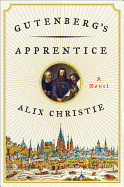
German scribe Peter Schoeffer has achieved a modicum of success at the university in Paris, but when his foster father, merchant Johann Fust, summons him home to Mainz, Peter never dreams that his life and career will be transformed. Instead of continuing as a scribe, Peter begins an apprenticeship studying a brand-new art under a mercurial, passionate man: Johann Gensfleisch, better known as Gutenberg.
Working in secret, dodging the city's powerful guilds and supported by gold from Fust's coffers, Peter and his colleagues in Gutenberg's workshop embark on a daring venture: printing copies of the Bible to sell. As the project drags on, requiring more and more funding, Fust grows impatient, often asking his son to spy on Gutenberg's activities. Peter, weary of being used as a pawn by the two men he respects, must eventually decide whether to throw his lot in with his father or with his master--or make a stand for himself.
Debut novelist Alix Christie draws a dark, evocative portrait of 15th-century Mainz, emphasizing the heavy hand of the city council, which often clashes with the archbishop over matters of commerce and religion. Gutenberg emerges as a clever trickster--erratic, smooth-talking, endlessly slippery--who manages to circumvent all restrictions, buying himself and his apprentices the time and resources to complete their ambitious project. Gutenberg's Apprentice has powerful parallels to the present day conflicts concerning old and new methods of distributing text. Drawing on historical accounts of Peter's real-life inspiration, Christie has created a rich, masterful tale of "the darkest art" and its powerful effect on the written word. --Katie Noah Gibson, blogger at Cakes, Tea and Dreams

